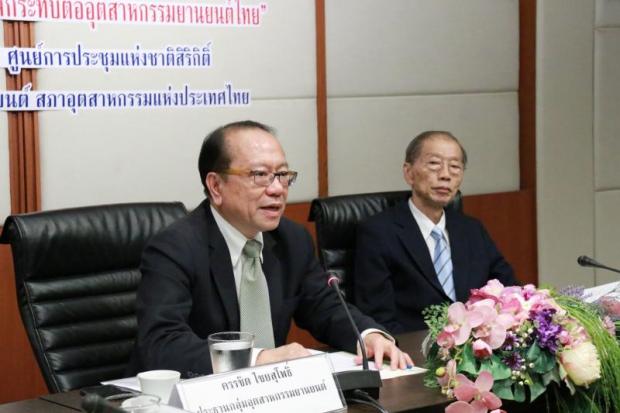
The Federation of Thai Industries (FTI) is calling for the government to prohibit importing used buses and trucks to be registered here to support local assembly sites and to expand the parts supply chain.
Khanchit Chaisupho, chairman of the FTI's auto industry club, said Thailand's local bus and truck assemblers have been affected by the import of used units for several years now, while many assembly companies are concerned imports could destroy the country's automotive industry.
He said local assemblers have great potential to improve and make Thailand an Asean production hub for buses and trucks because the country's automotive sector has been developing over the last six decades, becoming the leading producer of passenger cars and pickups in Southeast Asia. Thailand is ranked 12th for global car production.
"We want the Thai government to ban the import of used buses and trucks being registered locally, just like it does for imported used cars. Furthermore, related agencies should launch more measures to support local assemblers and attract more local auto parts for these commercial vehicles, [just like] measures which are aimed at serving car makers," said Mr Khanchit.
"The club believes it will solve many problems in this sector, including the high number of road accidents, mainly from used buses and trucks. Thailand can be a hub for [making] these commercial vehicles in Southeast Asia," he said.
Thailand makes 28,000 buses and trucks per year, second in the region after Indonesia, which has capacity of 100,000 units per year. Malaysia is third, said the club.
Mr Khanchit said the club is also concerned about the quality of used buses and trucks, which are neither safe forms of road transport nor meet emission standards.
He said Japan export a large number of used buses and trucks to Thailand because vehicles that are over 12-years-old there are subject to a higher transport tax, enticing operators to buy new ones.
Meanwhile, Mr Khanchit said the club is also monitoring the import of used units from China.
"At present, Japan exports 7,000 used buses and trucks and the club is worried about that volume growing," said Mr Khanchit.
He said the club has urged the government to maintain its 80% import tariff on import cars after independent car importers have called for that duty to be cut to 30%.
Mr Khanchit said if the import duty is cut, it will impact the overall automotive industry, while many car makers will suspend their assembly lines and shift to importing new models instead.
Citing research from Bryan Cave Thailand and Thammasat, he said cutting the import tax could create problems for the country's automotive industry as well as the government, which would lose 40-50 billion baht in tax revenue, based on the 2012 fiscal year, which saw the highest number of imported cars.
During 2010-2012, sales in the grey market were between 10,000-12,000 vehicles from 100 operators.
The club is also calling for the Land Transport Department to tighten regulations for the registration of imported cars from the grey market, saying emission standards should be tested at a laboratory in Thailand.